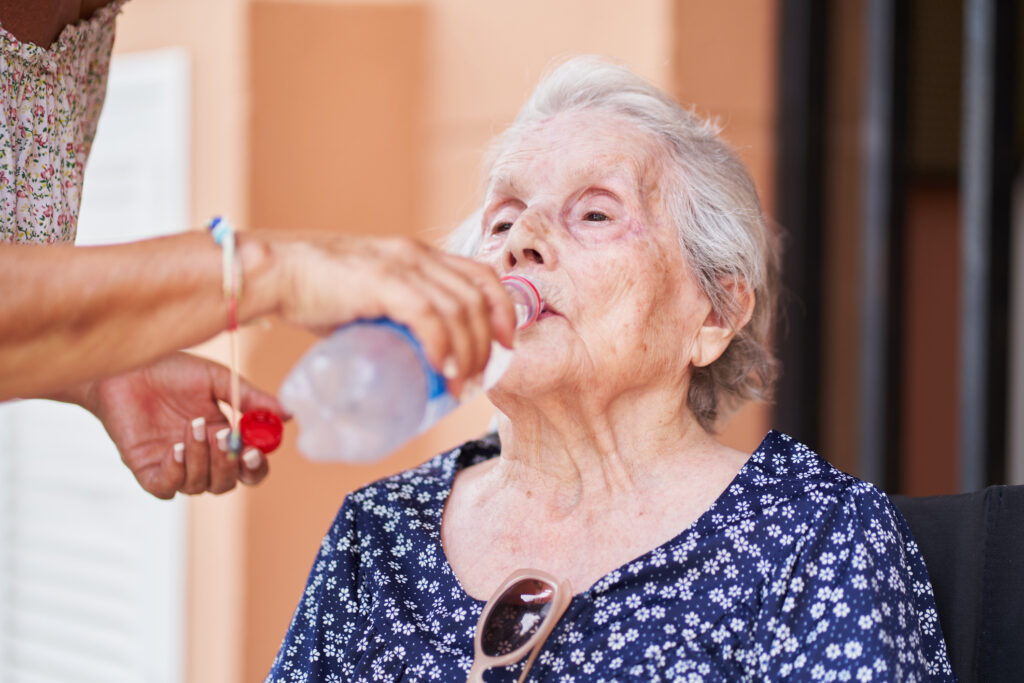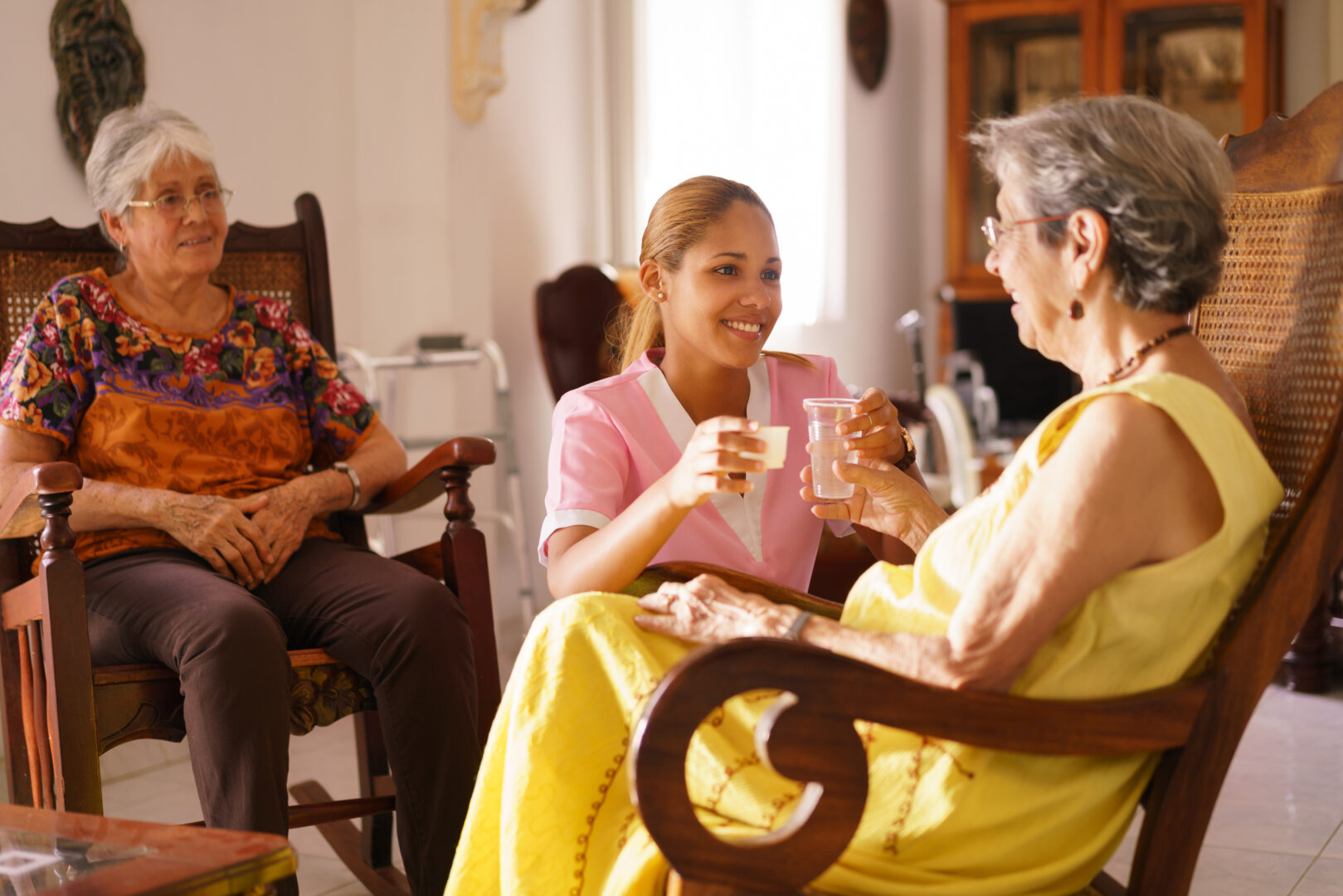As people age, their bodies handle water differently. They naturally have less water in their bodies because they lose muscle and gain fat. This makes older folks more likely to get dehydrated.
What’s more, as we get older, we don’t feel thirsty as much. This means seniors might not drink as much as they need, raising the chances of dehydration.
Also, some illnesses and medicines that are common in older adults mess with the body’s water balance. Issues like diabetes and heart disease, as well as medicines like water pills, can make the body lose fluids.
Recommended Daily Fluid Intake for Seniors
How much water should seniors drink? It depends on things like age, health, and how active they are. But a good rule is at least 8 cups (64 ounces) of fluids a day. This isn't just water but also includes drinks and watery foods like fruits.
Water should be the go-to drink because it helps with digestion, blood flow, and keeping cool. Plus, it has no calories or sugar.
Besides water, herbal teas, decaf drinks, and low-sugar juices are good. But it's best to go easy on drinks with caffeine or lots of sugar, as they can make dehydration worse.
Signs and Symptoms of Dehydration in Older Adults
Detecting dehydration in older adults can be challenging, as the signs and symptoms may not be as apparent as in younger individuals. It is crucial for both seniors and their caregivers to be aware of the following signs and symptoms:
- Dry mouth and sticky saliva
- Thirst or a decreased desire to drink fluids
- Fatigue or weakness
- Dizziness or lightheadedness
- Confusion or disorientation
- Sunken eyes
- Decreased urine output or dark-colored urine
- Dry, cool skin
- Headaches or migraines
- Constipation
If dehydration is suspected, it is important to address it promptly. Encourage the individual to drink fluids, preferably water, and seek medical attention if the symptoms worsen or persist.
Factors Affecting Senior Hydration
Medications and Their Impact on Fluid Balance
Medications help seniors with health issues, but some mess with the body's water levels and can cause dehydration. Diuretics, for example, make you pee more. Talking to a doctor about medicines and their side effects can help. It’s key for seniors to know how their meds work and drink enough water to balance things out.
Common Health Conditions That Increase the Risk of Dehydration
Health issues common in seniors, like diabetes, can make dehydration more likely. Diabetes makes you pee more and can hurt kidney function, making hydration tricky. Kidney issues and stomach problems can mess with water levels too. Seniors with these problems need to watch their water intake and work with doctors to stay on top of it.
Practical Tips for Encouraging Hydration in Seniors
Hot weather can make seniors dehydrated, especially if they can't feel thirst or control body temperature well. To stay hydrated, seniors should drink even if they're not thirsty and avoid too much heat. Seniors in care homes need help accessing water. Everyone involved should work together to keep seniors hydrated and healthy.
Offer a Variety of Suitable Fluids
Provide a range of appealing options considering seniors' needs, including flavored water, herbal teas, broths, soups, fruits, and vegetables with high water content. Consider individual preferences and cultural backgrounds.
Suggest adding fruit slices, herbal or fruit teas, or using water filters to enhance taste. Insulated bottles with straws or spouts can make water more convenient, especially for those with mobility challenges.
Make Drinking Water Enjoyable
Set up gentle reminders or alarms to prompt regular fluid intake. Encourage seniors to drink water upon waking up, before meals, and before bedtime to establish a hydration routine.
Emphasize Balanced Electrolyte Intake
Discuss the importance of consuming foods rich in electrolytes, like bananas, oranges, yogurt, and nuts, to maintain fluid balance. However, seniors with specific medical conditions should consult healthcare providers for personalized guidance.

Addressing Challenges and Barriers to Hydration
One of the common challenges faced by individuals, especially seniors, is a change in taste preferences and a loss of appetite. These factors can make it challenging to consume an adequate amount of fluid throughout the day. However, several strategies can help overcome this barrier:
- Flavorful alternatives: Infusing water with fruits, such as citrus slices or berries, can add a hint of flavor without relying on sugary or artificially flavored beverages. Herbal teas or flavored water can also provide variety and make hydration more appealing.
- Temperature preferences: Some individuals find cold beverages less palatable. Offering room temperature or warm fluids, like herbal teas or broths, may be more enticing and easier to consume.
- Snack on hydrating foods: Many fruits and vegetables have high water content. Encouraging the consumption of watermelon, cucumbers, oranges, and other hydrating foods can contribute to overall fluid intake.
- Small, frequent sips: Instead of drinking large volumes of fluid at once, encourage regular, small sips throughout the day. This approach can be less overwhelming and help maintain hydration levels.
Managing Urinary Incontinence and Frequent Bathroom Visits
Seniors dealing with urinary incontinence and frequent bathroom visits may be hesitant to consume an adequate amount of fluids. Fear of accidents or inconveniences can lead to reduced fluid intake, which can have adverse effects on overall health. Here are some strategies to address this challenge:
- Timed fluid intake: Encourage individuals to consume most of their fluids earlier in the day, allowing time for the body to process them and reducing the frequency of nighttime bathroom visits.
- Bladder training: Gradually increasing the interval between bathroom visits can help improve bladder control and reduce the frequency of urination. Consulting a healthcare professional, such as a urologist or a physical therapist, can provide personalized guidance.
- Assistive devices: For individuals with mobility issues, using assistive devices such as bedside commodes or urinals can make bathroom visits more convenient and reduce the fear of accidents.
- Pelvic floor exercises: Strengthening the pelvic floor muscles through exercises like Kegels can help improve bladder control and reduce instances of incontinence. A healthcare professional can provide guidance on performing these exercises correctly.
Discussing Hydration With Seniors Experiencing Cognitive Decline
Seniors experiencing cognitive decline, such as those with dementia or Alzheimer's disease, may struggle to understand or remember the importance of staying hydrated. Engaging in conversations about hydration can be challenging, but the following strategies can help:
- Visual reminders: Placing visual cues, such as colorful signs or pictures depicting water, near the person's living area or on water bottles, can serve as reminders to drink fluids.
- Setting a routine: Establishing a consistent hydration routine can help make drinking fluids a habit. Offering fluids at regular intervals, like during meals or medication times, can increase the likelihood of consumption.
- Simplifying choices: Presenting limited options can make decision-making easier for individuals with cognitive decline. Offering choices between two different beverages or using a contrasting-colored cup can help stimulate interest and facilitate decision-making.
- Family involvement: Engaging family members and caregivers in the conversation about hydration can provide support and reinforce the importance of drinking fluids
Hydration Assistance and Support
Family members and caregivers play a vital role in supporting and promoting hydration for their loved ones. By encouraging their active involvement and providing them with the necessary education, we can ensure that individuals receive the support they need. Here are some strategies to consider:
- Education on hydration importance
- Encourage active participation
- Training on hydration signs and symptoms
- Collaboration with healthcare professionals
Benefits of Hydration Monitoring Tools and Apps
Tracking Fluid Intake
Hydration apps and monitoring tools allow individuals to track their daily fluid intake easily. These tools provide a visual representation of consumed fluids, making it easier to identify any gaps in hydration.
Setting Reminders
Hydration apps can send notifications and reminders to individuals and caregivers, prompting them to drink fluids at regular intervals. These reminders can be particularly helpful for those with busy schedules or individuals who may forget to hydrate.
Customized Recommendations
Some hydration apps offer personalized recommendations based on factors such as age, weight, and activity level. These recommendations can help individuals meet their specific hydration needs.
Monitoring Hydration Levels
Certain hydration monitoring tools use wearable devices or smart water bottles that track an individual's hydration levels in real time. These devices provide feedback on the individual's hydration status and can be particularly useful for those with medical conditions or specific hydration goals.
Hydration is essential for the well-being of seniors, but it can pose challenges due to various factors such as aging, health conditions, medication use, and environmental factors.
By implementing practical strategies and addressing barriers, we can promote and maintain proper hydration in seniors. Offering a variety of suitable fluids, making hydration enjoyable, establishing reminders and routines, emphasizing balanced electrolyte intake, and addressing specific challenges like cognitive decline and urinary incontinence can all contribute to ensuring seniors stay adequately hydrated.
Additionally, involving family members, utilizing hydration monitoring tools and apps, and accessing community resources and support groups can provide valuable assistance in promoting hydration. By prioritizing hydration, we can help seniors maintain their health, vitality, and overall quality of life.





